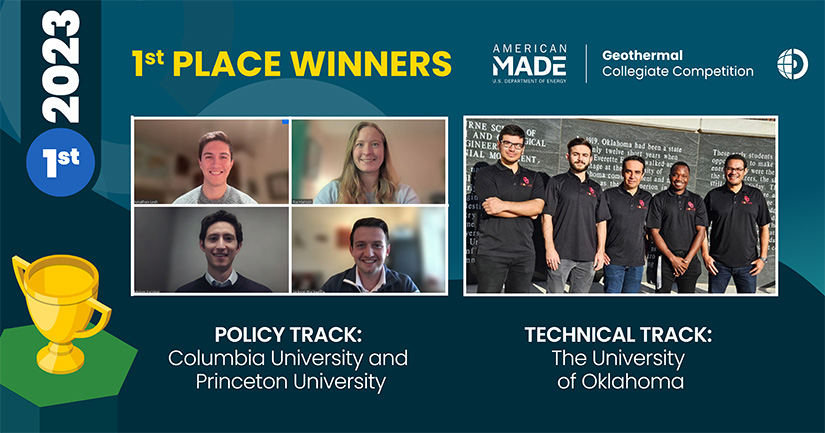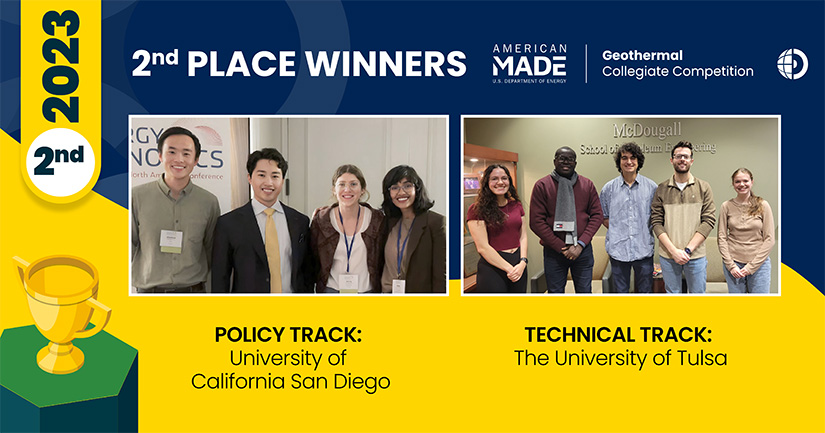2023 Geothermal Collegiate Competition Winners Innovate To Meet Community Energy Needs
Teams From the University of Oklahoma, Columbia University and Princeton University, the University of Tulsa, and University of California San Diego Earned the Top Spots—and $32,000 in Total Prize Funding

The winners of the U.S. Department of Energy 2023 Geothermal Collegiate Competition rose to the top by innovating to meet community energy needs through clean, renewable geothermal heating and cooling.
The University of Oklahoma (Team GeoTribe) won first place in the Technical Track, and students from Columbia University and Princeton University took first in the Policy Track, for their creative proposals for geothermal systems in communities across the country.
The annual challenge offers college students experience in the renewable energy industry and the chance to win cash prizes for developing real-world geothermal solutions.
Each first-place team will receive a $10,000 cash prize plus funding to host a community event where they will present their projects and discuss geothermal. Second place teams will receive a $6,000 cash prize.
"These teams did a tremendous job looking at ways geothermal energy can serve their communities with clean, reliable heating and cooling—24 hours a day, 7 days a week," said Jeff Marootian, principal deputy assistant secretary for energy efficiency and renewable energy. "We're always impressed by the caliber of projects brought to this competition. Seeing such ingenuity in action gives us an exciting glimpse at the possibilities ahead as these students help us shape our clean energy future."
Technical Track teams designed a geothermal heating and cooling system from the ground up for a proposed community of their choice. Teams in the Policy Track, which was offered for the first time this year, conducted an analysis of the regulatory environment and economic feasibility for a proposed geothermal system.
First-place
Technical Track
The winning team from The University of Oklahoma designed a system of geothermal wells to heat and cool the Osage Nation's 40,000-square-foot greenhouse, supporting efforts for native food sovereignty in Pawhuska, Oklahoma. The greenhouse was established during the COVID-19 pandemic when there was a breakdown in the Tribe's food system. The proposed geothermal system design would help alleviate the challenge of maintaining a constant year-round growing temperature.
Policy Track
Columbia University and Princeton University partnered with the Native Village of Elim to explore geothermal options for the 330-person Alaskan town. The team's economic analysis of their proposed ocean-based closed-loop geothermal heating and cooling system found that system costs could be recouped in as little as 14 years, advancing clean energy in a manner consistent with the Inupiat way of living from the land and saving residents more than 2.3 million gallons of fuel oil and 70 million pounds of wood over 30 years.
Second-place
Technical Track
The University of Tulsa took second place for designing a system to bring geothermal to the Lorton Performance Center—a musical and performance arts hub that currently accounts for 6% of the university's heating and cooling costs—by using horizontal piping installed under a nearby athletic field.
Policy Track
The University of California San Diego team proposed using federal incentives to revitalize the Boise Cascade Mill—a brownfields site in Cascade, Idaho—with a geothermal system that could meet an 8.6-GWh annual energy demand for over 2,800 residents while creating nearly 100 local jobs.

"We are excited to support these teams as they plan their community events, providing a real-world, hands-on learning experience while students are still in school," said Elisabet Metcalfe, communications and stakeholder engagement lead for the Geothermal Technologies Office. "Part of any new geothermal development is engaging with the local community, so this is a key part of this year's competition."
The U.S. Department of Energy Geothermal Technologies Office has funded the Geothermal Collegiate Competition (GCC) for more than 10 years, supporting workforce development and giving students a chance to gain resume experience in the geothermal industry while still in school. The National Renewable Energy Laboratory administers the competition, and the GCC is now a part of DOE's American-Made collection of prizes and competitions.
Interested in competing in the next edition? Learn more through the competition website.
Last Updated May 28, 2025
